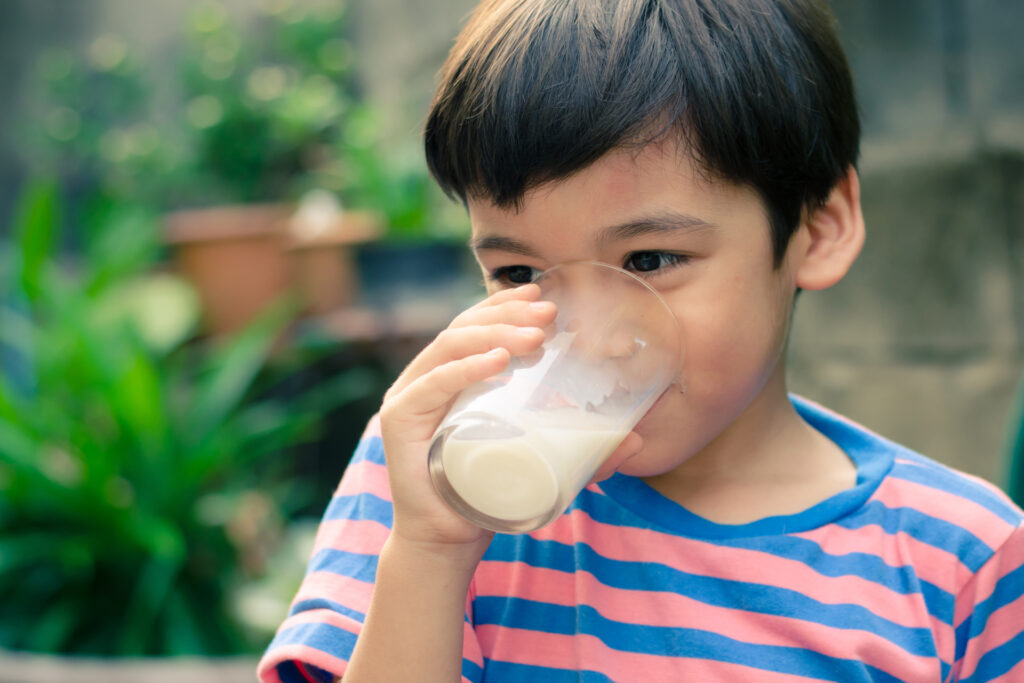Is Milk Good for Children’s Teeth?

It seems that avoiding dairy products is becoming increasingly common due to a perception that cow’s milk is unhealthy for children. While there certainly are valid health reasons for some kids to avoid milk, for many other children, cow’s milk is an important source of nutrients that are essential for their development and for keeping their teeth strong and healthy.
In fact, with limited exceptions, both the American Academy of Pediatric Dentistry and the American Academy of Pediatrics recommend that most children between the ages of one and five drink only water and plain cow’s milk.
Surprised? Read on for more information about the following topics:
- The Benefits of Cow’s Milk for Children’s Teeth
- Does Milk Cause Tooth Decay in Children?
- How Much Milk Should Children Drink?
- Should Kids Drink Plant Milks Instead of Cow’s Milk?
- Is It Okay to Put Your Toddler to Bed with a Bottle of Milk?
Benefits of Milk for Children’s Teeth
Milk is an excellent source of minerals that are essential for building strong teeth.
Your child’s dental enamel (the hard, protective outer layer of the tooth) consists primarily of calcium and phosphorus. When teeth are exposed to acid, they lose calcium and phosphorus in a process known as demineralization. Fortunately, if your child’s saliva contains sufficient levels of these minerals, it can often help reverse the damage in a process known as remineralization.
However, if the harmful demineralization process is permitted to outpace the healing remineralization process for a long enough period, your child’s tooth will end up with permanent damage in the form of a cavity. Promoting remineralization through the consumption of sufficient amounts of calcium and phosphorus can help keep your child’s teeth strong and protect them against cavities.
Consuming dairy products is an easy way for many children to incorporate calcium and phosphorus into their diet. Cow’s milk is a terrific source of both minerals and, what is more, the calcium and phosphorus in cow’s milk is highly bioavailable.
Bioavailability refers to how easily your body can use nutrients. Consuming calcium and phosphorus in forms that are poorly bioavailable will not benefit your child’s teeth in the same way that consuming them in highly bioavailable forms will.
As a result, simply comparing the nutrition labels of two beverages does not necessarily allow you to determine which one will help build stronger dental enamel. As an example, one study comparing cow’s milk products against calcium-fortified soy milk beverages found that, even though the total calcium and phosphorus contents of the two types of beverages were similar, the calcium and phosphorus in the cow’s milk products were much more bioavailable than those in the soy milk beverages.
Does Milk Cause Tooth Decay in Children?
Cow’s milk contains lactose, which is a type of sugar. Consuming sugar can lead to cavities. Logically, then, drinking cow’s milk must lead to cavities, right?
Actually, no.
Studies have repeatedly found that cow’s milk is not cariogenic, meaning that milk does not increase the risk of cavities in children. It turns out that, while milk does contain lactose, it also contains components that counteract the harmful effects of lactose.
One of the most extensively studied anticariogenic (i.e., cavity-inhibiting) components of cow’s milk is the protein casein. Casein phosphopeptide, a derivative of casein, has been shown to help prevent tooth demineralization, enhance tooth remineralization, and prevent cavity-causing bacteria from adhering to tooth surfaces.
Researchers believe that casein phosphopeptides work together with the bioavailable calcium and phosphorus found in cow’s milk to effectively negate any harmful effects of the milk’s natural sugar contents.
How Much Milk Should Children Drink?
A consensus report by the American Academy of Pediatric Dentistry, the American Academy of Pediatrics, the Academy of Nutrition and Dietetics and the American Heart Association recommends that children drink the following quantities of milk:

Note that these recommendations apply to plain cow’s milk only. The consensus report discourages giving flavored milks (such as strawberry milk and chocolate milk) to children, as flavored milks typically contain added sugars.
The American Academy of Pediatrics recommends against giving cow’s milk to children under 12 months of age, as young infants cannot digest cow’s milk properly and cow’s milk does not provide the proper amounts of nutrients that babies need. Infants under 12 months should instead be fed breastmilk or infant formula.
Should Kids Drink Plant Milks Instead of Cow’s Milk?
The above-mentioned consensus report recommends against serving children ages one to five plant milks (such as soy milk or almond milk) in place of cow’s milk, except as medically indicated or to meet specific dietary preferences.
In reaching this recommendation, the panel noted that, although plant milks are sometimes fortified with calcium and other nutrients, the bioavailability of the added nutrients may not be comparable to that of the naturally-occurring nutrients in cow’s milk.
Additionally, many non-dairy milk beverages contain added sugars. Various studies have found that sugar-sweetened plant milks can lead to cavities.
If you are considering giving your child plant-based milk beverages, we recommend consulting with your child’s pediatrician and avoiding beverages with added sugars.
Can I Put My Toddler to Bed with A Bottle of Milk?
Cow’s milk is good for children’s teeth when drunk from a cup, but we recommend against putting your toddler to bed with a bottle of milk. In fact, the American Academy of Pediatric Dentistry recommends that children stop using baby bottles entirely by ages 12 to 18 months.
Bottles obstruct the flow of saliva in children’s mouths. Because saliva flow is important for cleaning teeth and promoting tooth remineralization, sucking on a bottle for a prolonged period (such as when a child falls asleep with a bottle in his or her mouth) may increase a child’s risk of developing cavities. This may be true even if the liquid inside the bottle is not one that causes cavities itself. For example, if a small piece of cavity-causing food is stuck to one of your toddler’s teeth, an obstruction that reduces the amount of saliva flowing to, and cleaning, that tooth could increase the risk of decay.
Board-Certified Pediatric Dentist in Hurst, Texas
Have more questions about your child’s diet? We are happy to help! At Hurst Pediatric Dentistry, we make patient and parent education a priority. We encourage parents to join their children during dental exams and consultations and are happy to answer any questions you may have about your child’s teeth. Make an appointment for your child today by calling us at 817-510-6400.
Hurst Pediatric Dentistry is located in Hurst, Texas, and serves children from Hurst, Bedford, Euless, North Richland Hills, Colleyville, Keller, Fort Worth and the surrounding area.
This article is intended to provide general information about oral health topics. It should not be used to diagnose or treat any disease or as a substitute for the advice of a healthcare professional who is fully aware of and familiar with the specifics of your case. Always seek the advice of your dentist or other qualified healthcare provider with any questions you may have regarding a medical condition or treatment.
MEDICALLY REVIEWED BY:
Dr. Jin Lin

Dr. Jin Lin is a board-certified pediatric dentist with a passion for helping children achieve healthier, more beautiful smiles. He earned his Bachelor of Science degree from Cornell University and his Doctor of Dental Medicine (D.M.D.) degree from the Harvard School of Dental Medicine. After graduating cum laude from dental school, he completed his post-doctoral pediatric dentistry training at Boston Children’s Hospital and the Harvard School of Dental Medicine, where he served as chief resident and worked with children with a wide variety of special medical and dental needs, including children with rare syndromes.

